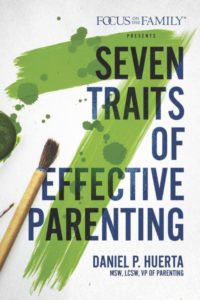What do you think of when you hear the word discipline? Many people immediately make the association with “punishment.” And, according to the Focus on the Family website statistics, a lot of people are asking whether spanking is biblical or not.
The truth is, the Bible – and the dictionary, for that matter – take a much broader view of discipline.
Discipline comes from the word “discipulus,” which means “pupil or follower/learner.” With that in mind, a parent’s role is to teach, guide, correct, and love. As a family, take a look at Psalm 119 and notice the love of correction and guidance. How does this change your perception of discipline and its importance in our lives?
If biblical discipline is what you’re after, there are plenty of examples you can put into your comprehensive discipline toolkit. Spanking may have a place in the toolkit, but it’s one of those tools used in very rare occasions, explained below.
Parents who learn the 7 Traits of Effective Parenting are more likely develop a full range of tools appropriate for most circumstances. Using biblical discipline, and these tools, parents are also more likely to use spanking appropriately.
Let’s take a quick look at a few basics for your biblical discipline toolkit. But before we do, there’s a few things to keep in mind no matter which tool you pull out of your kit.
- Clarity and consistency is key – it seems kids need correction at the most inopportune times, which leaves parents oftentimes correcting out of frustration and anxiety. What we’re aiming for when correcting is being fully engaged with the goal of guiding kids toward a relentless pursuit of wisdom and, eventually, maturity with God.
- Look for teachable moments – our days are filled with them. And what a privilege it is to be their teachers (see Deuteronomy 6 and 11).
- Recognize the differences in your kids – some personalities are more difficult to raise than others. They can be frustrating, but if you bring your parenting “A” game and the full range of discipline tools, you can help shape your child’s distinctive personality characteristics for amazing things.
Verbal Redirection
Kids need boundaries and verbal redirection, this helps them understand where those boundaries lie.
- For example, you can help your children succeed at being respectful. Let’s say your child happens to be rude to his sibling. Try coaching words such as “You can try that again, but this time with respect.” Warning: this may take some time and patience, but it’s an investment well worth the effort.
- Give them the yeses along with the nos. With very young kids, it might look like this, “No, you can’t touch that, but you can touch this.”
- Verbal redirection sometimes requires a plain and stern “no,” but it never includes sarcasm.
- I notice parents sometimes say “please” when reminding a child to do a chore. “Charlie, please wash the dishes,” implies you’re asking a favor or making a plea for help. However, since that chore is his predetermined responsibility, it’s more effective to remind him of his responsibility with something as simple as “Charlie, you can wash the dishes now. It’s a small difference in words but a big difference in implication.
Help kids know boundaries, enforce them consistently and recognize it when they behave appropriately within those limits. (For more on biblical discipline and modeling boundaries and limits, refer to the 7 Traits of Effective Parenting.)
Celebrations
Set character goals and celebrate when your kids meet those goals. For example, if you think your family needs to work on obedience, keep track of how many times the family has succeeded in that area. Once your tracker hits 20, (or whatever your predetermined amount), that’s your cue for a celebration – maybe a family fun night, a visit to a favorite restaurant or a trip to a park.
Make it a big deal as you celebrate unity and cooperation as a victory for the home. The key in this one is that it is a celebration as a family and not rewards for your individual child.
Check out these verses about celebrating:
Time-outs
The purpose of time-outs is to settle an anxious brain and regain self-control. In fact, recognizing you need a time out, and then taking it, is a good life-long skill for developing self-control.
Generally, time-outs are quite effective, especially with extroverts that love interaction with and attention from others. For duration, think one minute for each year of age, so an appropriate time-out for a five-year old would be five minutes.
Did you know self-control is a fruit of the Spirit? Check out Galatians 5:22-23. Self-control is like a muscle, the more you use it, the more it depletes. However, over time the more you practice it, the more it strengthens and the less it depletes. Time-out is about regaining self-control.
Loss of Privileges
Losing a privilege is effective when:
- the child understands exactly why she lost it
- when the punishment fits the crime
For example, disrespectful behavior could result in the loss of going to a friend’s sleepover – a place where respect for others is expected. Or perhaps your child has exceeded pre-established time limits on an electronic device. That might result in loss of that device for a specified time.
Your child may get angry and that’s okay. It means you chose to remove the right thing and she’ll likely not repeat the behavior. Acknowledge her feelings, but separate them from the wrong behavior. It’s the behavior and the wrong thinking that lead to it that you are seeking to correct.
Loss of a privilege or a cherished object might be a better disciplinary tool than a time-out for some children, such as introverts for whom a time-out might feel like a reward.
You can see again and again in the book of Exodus, this was one of God’s discipline tools with the Israelites as they traveled toward the Promised Land.
Is Spanking Biblical Discipline or a Last Resort?
Scripture makes it clear that discipline includes loving guidance, correction, and teaching, not just punishment. When you make small corrections along the way, the odds of having to spank a child diminish. Spanking should be the last resort, done to capture attention and create clear understanding so that a particular behavior doesn’t happen again.
Psalm 23:4 states that the rod and staff are comforting. In Psalm 119, David sees God’s correction as loving and trustworthy – His commands keep David safe. The goal with your children is to get to a similar place.
Read some parameters around spanking in the other articles in the series such as– “Is Spanking Biblical?” and “To Spank or Not to Spank?”
Clearly, biblical discipline includes more than punishment. And punishment is more than spanking. Through small corrections along the way, effective discipline builds a foundation from which your kids can learn to manage themselves and their emotions. And, as Proverbs declares, that wisdom is more valuable than gold.



















